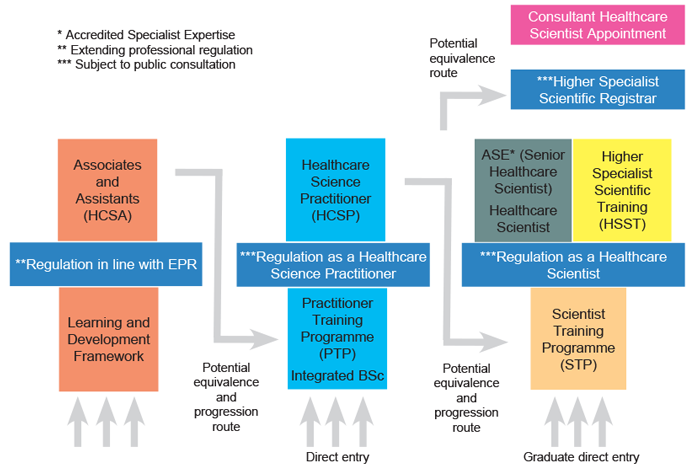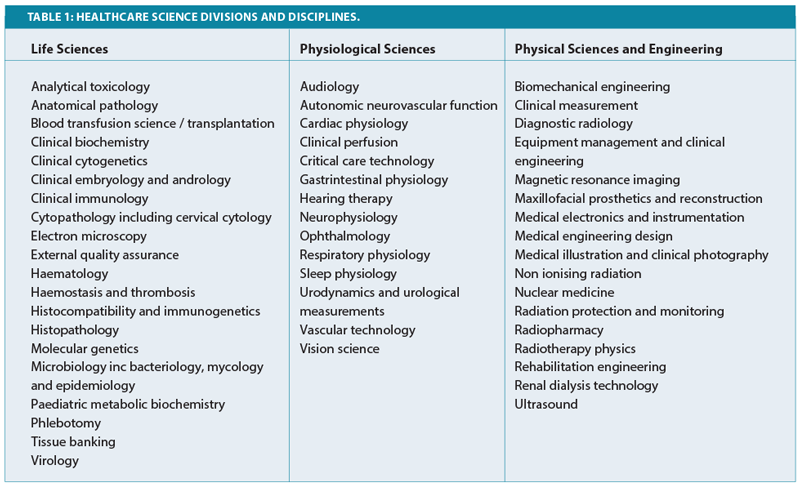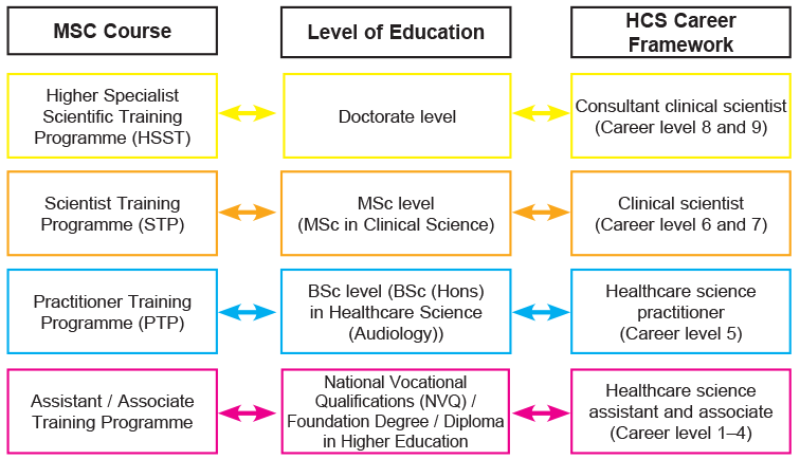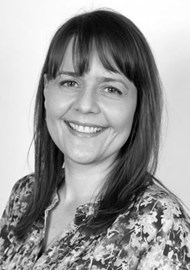Modernising Scientific Careers (MSC) is an education and training strategy for 51 disciplines in healthcare science within the National Health Service (NHS) in the United Kingdom (UK). Some of these disciplines lacked clear training routes as well as registration opportunities and it was envisaged that the MSC programme would provide a uniform structure for all professions within healthcare science [1].
To understand the impact of the MSC programme, it is best to view it in the context of healthcare provision in the UK. The Department of Health (DH) is a ministerial department that provides strategic direction and leadership to the NHS and it should be noted that the structure and remit of both the NHS and the DH may differ between the four countries in the United Kingdom (England, Scotland, Wales and Northern Ireland) [2].
In 2012, the BBC listed the NHS as the fifth biggest employer in the world with over 1.7 million employees [3]. Healthcare science comprises 5% of the total workforce in the NHS, which is approximately 85,000 employees. This small number of professionals contributes to almost 80% of diagnoses in all clinical pathways, ranging from prevention through to acute care across the life stages [1].

Figure 1: Modernising Scientific Careers: career and training pathways [1].
In the UK audiology is considered a part of healthcare science and it is included in the healthcare science career framework in the NHS. This career framework provides the healthcare science workforce with a coherent career pathway across nine levels and it includes aspects of education, training and workforce planning. Figure 1 is a summary of the proposed MSC healthcare science career pathway and it shows the entry points to the framework as well as possible progression routes through the different framework levels. It is important to note that the NHS employs the majority of audiologists in the UK.

The MSC programme was developed through a consultation process initiated by a DH publication in November 2008 called The Future of the Healthcare Science Workforce, Modernising Scientific Careers: the next steps [4]. In this document the 51 disciplines of healthcare science were grouped into three overarching strands: life sciences, physical sciences and engineering and physiological sciences (Table 1). Audiology falls within physiological sciences and is grouped with vision sciences and neurophysiology in the neurosensory science sub strand. In February 2010 the DH published a report called Modernising Scientific Careers: The UK Way Forward [1]. This report presented the outcome of the consultation period and discussed proposed routes for undergraduate and postgraduate training in healthcare science. It is the result of three years worth of work across the four countries of the United Kingdom. For the purpose of discussing education as specified by the MSC programme, we will focus on the sub strand that contains audiology.
Education
The MSC programme provides specific curricula for each profession in the healthcare science workforce. This was achieved by combining the education and training of relevant disciplines in a structure that contains a mixture of generic and specialist content. For audiology this meant including content for vision sciences and neurophysiology at undergraduate and postgraduate levels [1]. Figure 2 provides a summary explaining the link between education and the suite of courses within the MSc programme as well as the career framework levels (please note that this summary does not include equivalence for other relevant courses).
Figure 2: Links between level of education, the courses within the MSC programme and the HCS career framework.
Undergraduate and postgraduate degree structures
In 2011, three universities in the UK were accredited to offer the BSc (Hons) in Healthcare Science (Audiology (Practitioner Training Programme (PTP)) degree and two to offer the MSc in Clinical Science (Scientist Training Programme (STP)). A further five universities were accredited to offer the PTP degree in 2012. The curricula for the Healthcare Science Assistant and Associate, as well as for the Higher Specialist Scientific Training programme (HSST), should be available in 2014/2015. We will now consider the structures of the PTP and STP as specified by the MSC curricula (see weblink 2).
Practitioner Training Programme (PTP)
BSc in Healthcare Science (Audiology)
This is a three year BSc Honours degree in Healthcare Science (Audiology) and each of the three years contains a mixture of theory and work based placement. The first year of this degree provides students with an introduction to neurosensory sciences and it includes a rotational placement in all three areas (audiology, vision and neurophysiology). The second and third year of the degree provides specialisation in one of the three areas. Students can decide at the end of their first year to change to another specialism but may have to move to another university to pursue it.
Scientist Training Programme (STP)
MSc in Clinical Science
The STP consists of a three year clinical training programme combining work based training with an MSc degree. The work based element of the STP is provided through funded scientific training posts in the NHS. Students are recruited to the Scientific Training Programme through a centralised competitive process. The first 12 months of this programme contain rotational placements within each area of the neurosensory sub strand followed by an 18 month placement in the designated specialist area. The first cohorts, from both the STP and PTP programmes, will be graduating in 2014. Implementing the MSC curriculum is challenging as universities have to follow set guidelines by the DH. This is in addition to the quality assurance processes within the university, the relevant educational framework in each of the home countries as well as existing professional accreditation and/or regulatory bodies.
Further information
For more information on MSC please see the following websites:
NHS Careers, The National Health Service England.
http://www.nhscareers.nhs.uk/explore-by-career/
healthcare-science/modernising-scientific-careers/
Last accessed May 2014.
MSC curricula: NHS Networks.
http://www.networks.nhs.uk/
nhs-networks/msc-framework-curricula/ptp-1
Last accessed May 2014.
References
1. Department of Health, 2010. Modernising Scientific Careers: The UK Way Forward. London: HMSO.
2. Department of Health, 2013. Helping People Live Better for Longer. London: HMSO.
3. BBC, 2012. BBC News – Which is the world’s biggest employer? [online]. [viewed 7 April 2014]. Available from: http://www.bbc.co.uk/news/magazine-17429786
4. Department of Health, 2008. The Future of the Healthcare Science Workforce, Modernising Scientific Careers: the next steps. London: HMSO.
Declaration of Competing Interests: None declared.






